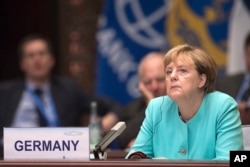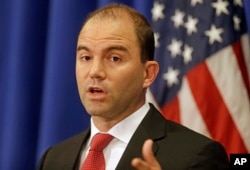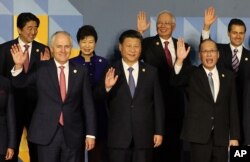President Barack Obama addressed a wide range of foreign policy and domestic issues Monday during a news conference with reporters at the White House.
The president stressed a readiness to "accelerate a smooth transition" for the president-elect. "It's part of what makes this country work," he said.
Obama said he asked his team to make sure they finish "what we started" regarding several key issues. He underscored the importance of stabilizing the global economy, and signaling solidarity with global allies of the U.S.
He also extended condolences to deceased journalist Gwen Ifill, whose death at 61 after several months of cancer treatment was confirmed Monday.
Obama was set to depart later Monday on the final planned foreign trip of his presidency. His advisors expect President-elect Donald Trump will be a primary topic of discussion with other leaders.
Deputy National Security Advisor Ben Rhodes said the itinerary with stops in Greece, Germany and Peru is a signal of solidarity to the country's closest allies and a way to show "support for a strong and integrated and united Europe."
The only major planned speech during Obama's trip is in Greece, on Wednesday, addressing work that remains to tackle economic challenges there and elsewhere in the world while promoting inclusive growth and combating inequality.
Rhodes said Obama will also, in talks with Prime Minister Alexis Tsipras, express support for what the Greek people have gone through in response to their economic crisis that brought international bailouts and strict requirements for cutting spending and public services.
Berlin leg
German Chancellor Angela Merkel hosts Obama for talks Thursday. Rhodes highlighted the importance of the relationship, calling Merkel "the president's closest partner over the course of his entire presidency."
The leaders of Britain, France, Italy and Spain will also be in Berlin for meetings Friday that are expected to include the ongoing fight against Islamic State, issues related to migration, the situation in Ukraine, and last week's U.S. election.
Trump repeatedly has spoken against international agreements reached during Obama's presidency, including the deal to limit Iran's nuclear program, the international climate deal that went into effect last month and the Trans-Pacific Partnership (TPP) that has not cleared the U.S. Congress. He also defeated Obama's fellow Democrat Hillary Clinton.
Ongoing issues
Rhodes said to reporters in previewing the trip that no matter the outcome of the election, Obama and the rest of his administration have a stake in seeing the next one succeed, and that the world also has a similar interest.
"There are many ongoing issues that we're working on that are deeply relevant to our security that we will want to discuss, and, again, agreements and alliances that have perpetuated over decades under administrations of many different stripes," he said.
In terms of the TPP, Obama is expected to meet with the other leaders involved in that deal during his stop in Peru to go over how Trump's election affects the pact and other trade issues. He also has a meeting scheduled with President Xi Jinping of China, which is not part of the TPP.
Asia
Obama made the Asia-Pacific region a major focus of his foreign policy, and in Peru his main agenda will be talking with leaders at the Asia-Pacific Economic Cooperation summit. Trump could decide on a different stance toward Asia, but Rhodes said that because of the region's growth and the number of treaty and trade partners the U.S. has there, he believes it will remain a priority.







